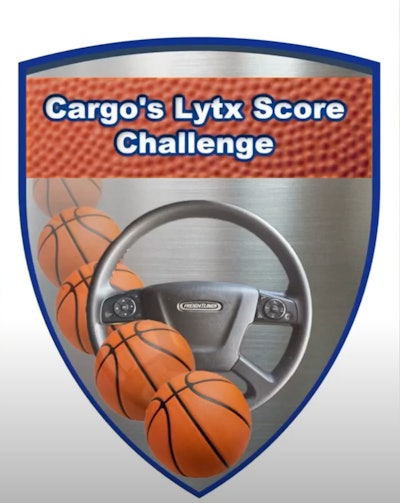
CCJ Innovators profiles carriers and fleets that have found innovative ways to overcome trucking’s challenges. If you know a carrier that has displayed innovation, contact CCJ Chief Editor Jason Cannon at [email protected] or 800-633-5953.
What did the march say to all the madness? What's all that bracket?
Many offices around the country engage in a friendly battle over which team will take home the trophy at the end of the annual March Madness NCAA college basketball tournament. Cargo Transporters (CCJ Top 250, No. 177) is no different, but all that bracket at the company goes beyond competitive banter surrounding employees’ chosen basketball teams to smack talk among driver leaders and their chosen drivers.
The North Carolina-based truckload carrier created a challenge among its drivers three years ago that coincides with March Madness to “make safety fun” while improving driver safety scores, and it’s getting results – so much so that the company has expanded it.
All Cargo Transporters tractors are equipped with a Lytx driver camera that uses machine vision and artificial intelligence to categorize safety events like distracted driving and hard braking, among others, that are used to coach drivers and improve unsafe driving behaviors. Lytx provides a safety risk score per driver based on those events and their severity. The fewer events a driver has, the lower their score, which is what Cargo Transporters uses to determine the winners of its Cargo Lytx Score Challenge.

“We say, ‘You did this for six weeks; there's no reason you can't keep doing this,’” he added. “In essence, this competition has changed behavior and made that driver safer and more aware of how to handle situations out on the road in a less risky fashion.”
Drivers move up the bracket as their scores improve; the goal is to make their risk score go down by eliminating risky driving events.
Not only does the competition coincide with March Madness, it’s modeled after the tournament as well.
The company has about 545 drivers, but there are only 64 slots for drivers to sign up. This year, compared to the previous two years, the competition has become so popular that the company has created two different tournaments: one among 64 over-the-road drivers and one among 64 local and short-haul drivers. To qualify, local and short-haul drivers need to work four out of five days a week, and OTR drivers need to attain 1,600 miles in a week with each bracket beginning on Sunday morning and concluding on Saturday evening. Risk points, based on Lytx analytics, are calculated during that time frame to determine which drivers are seeded against each other and which driver moves on to the next round.
Two comparably seeded drivers go head-to-head against each other, and the driver with the lowest overall score at the end of the week moves on, again seeded against another driver with a comparable score. If a tie breaker is needed in the OTR tournament, the company uses the previous week’s scores and mileage from the current week of competition. If needed in the local/short-haul tournament, the tie breaker is the previous week’s scores and revenue per hour of the current week.
The competition moves from 64 drivers to 32 before entering the Sweet 16 and Elite 8 rounds. The Final Four enter the championship round. This year’s winner will be announced on April 8 – the day of the March Madness championship game.
Having skin in the game makes the difference, Sigmon said, and the competition comes with more skin than simple bragging rights.
The company reached out to one of its insurers to sponsor the event, and the winners of each tournament are set to receive $500 gift cards. The runners up of each will receive $250 gift cards. The most improved driver in each gets a $100 gift card, and the fleet leader of the winning driver gets a $50 gift card. Other prizes for earlier brackets include branded hats, mechanic gloves, flashlights and JBL speakers.
The marketing group puts together a weekly video with updates from Operations Manager Malcolm Styres and Regional Planner Derrick Puckett to keep the spirit up.
Sigmon said the challenge fosters camaraderie and boosts morale.
“A lot of (drivers) are competitive by nature. ‘My truck is cleaner than yours. I had a better load than you did. I got more miles last week than you did,’” he said. “They like to compete, and this gives them an outlet to compete head-to-head against their peers.”
He said the drivers like the March Madness-based challenge so much that the company expanded it this year to include another challenge related to football in which each fleet leader had a team of 12 drivers compete together against another 12 drivers that culminated in a playoff that coincided with the Super Bowl.
Sigmon said the challenge has permanently improved many individual driver risk scores.
Shelley Dellinger, director of recruiting and marketing, said drivers have the ability to access their Lytx scorecards, but the company realized many didn’t despite that. She said the challenge encouraged them to seek that out and look at their safety events.
“Even though some of the events aren't scored or they're not coached on them, we felt like if they would access that information, they would be better informed of what was going on,” she said. “We're just trying to reach them in a different way.”
Sigmon said the challenge has resulted in drivers self-coaching on many occasions before a manager needs to step in. The original concept for the challenge came out of safety meetings that focused on how to gain drivers’ attention to the Lytx program.
“Any time we have any risk – and there's always going to be risk out there – we want to continue to try to remove the risk. If we're having any scores at all, we want to continue to work to improve them,” he said. “The old saying is, ‘people play the game differently if you keep score,’ so we started keeping score, and we had a little game of it, and it seems to be working out.”
The CCJ Innovators program is brought to you by Bestpass, Chevron Delo, Comdata and Freightliner Trucks.











